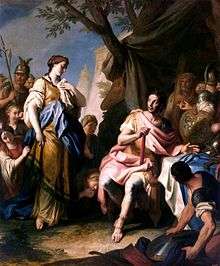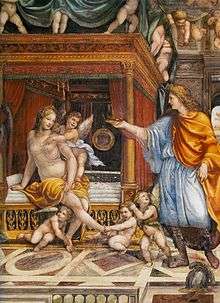Roxana
Roxana (Ancient Greek: Ῥωξάνη; Old Iranian Raoxshna; sometimes Roxanne, Roxanna, Rukhsana, Roxandra and Roxane) was a Sogdian[1][2][3][4] or a Bactrian[5][6][7][8] princess of Bactria whom the Macedonian king, Alexander the Great, married, after defeating Darius III, the Achaemenian king, and invading Persia. She was born in c. 340 BC,[9] though the precise date remains uncertain, and died in c. 310 BC.[4]

.jpg)
| Roxana | |
|---|---|
 Marriage of Alexander and Roxana by Il Sodoma | |
| Born | 340 BC Sogdia or Bactria |
| Died | 310 BC Amphipolis |
| Spouse | Alexander the Great |
| Issue | Alexander IV |
| Father | Oxyartes |
| Religion | Zoroastrianism |
Biography
Roxana was born in c. 340 BC as the daughter of a Bactrian nobleman named Oxyartes, who served Bessus, the satrap of Bactria and Sogdia. He was thus probably also involved in the murder of the last Achaemenid king Darius III. After Bessus was captured by the Macedonian ruler Alexander the Great, Oxyartes and his family continued to resist the Greeks, and along with other Iranian notables such as the Sogdian warlord Spitamenes, took up a defensive position in a fortress known as the Sogdian Rock.[9]
However, they were eventually defeated by Alexander, who reportedly fell in love with Roxana on sight;[10] in 327 BC, Alexander married Roxana despite the strong opposition from all his companions and generals. Alexander thereafter made an expedition into India and while there he appointed Oxyartes as the governor of the Hindu Kush region which was adjoining India. During this period, Roxana was in a safe place in Susa. When Alexander returned to Susa, he promoted a brother of Roxana to the elite cavalry.[9]
After Alexander's sudden death at Babylon in 323 BC, Roxana is believed to have murdered Alexander's other widow, Stateira II, and possibly Stateira's sister, Drypteis,[11] and her cousin, Parysatis II (Alexander's third wife). Roxana had borne a son to Alexander after his death and would have wanted no competition.
Roxana and her son, named Alexander IV after his deceased father, were protected by Alexander's mother, Olympias, in Macedonia. Olympias' assassination in 316 BC allowed Cassander, who imprisoned Roxana and Alexander in the citadel of Amphipolis under the supervision of Glaucias, to seek kingship. Since Alexander IV was the legitimate heir to the Alexandrian empire, Cassander ordered Glaucias to poison Alexander and Roxana c. 310 BC.
Historical novels and film
- Roxana is one of the main characters in The Romance of Alexander and Roxana by Marshall Monroe Kirkman, 1909, reprinted 2010, ISBN 978-1-160-01995-8.
- Roxana appears as one of the characters in A Conspiracy of Women by Aubrey Menen, 1965.
- Roxana appears as one of the minor characters in The Persian Boy by Mary Renault, 1972, ISBN 0-394-48191-7. Renault uses the spelling Roxane.
- Roxana appears as one of the characters in Funeral Games by Mary Renault, 1981, ISBN 0-394-52068-8. Renault uses the spelling Roxane.
- Roxana appears as one of the characters in Alexander: The Ends of the Earth by Valerio Massimo Manfredi, 2002, ISBN 978-0-7434-3438-6.
- Roxana is the main character in Roxana Romance by A. J. Cave, 2008, Hardcover ISBN 978-0-9802061-0-4, eBook ISBN 978-0-9802061-1-1.
- Roxana is one of the main characters in The Conqueror's Wife by Stephanie Thornton, 2015, Softcover ISBN 978-0-451-47200-7
- In the film Alexander (2004), Roxana is played by Rosario Dawson.
- Indian TV actress Aparna Dixit portrays the role of Roxana in 2017 Indian TV Series Porus with the name Roxane.
- Roxana among other historical characters of that era are in the time-travel alternate history novel The Alexander Inheritance by Eric Flint.
Honors
Asteroid 317 Roxane is named in her honor.[12]
See also
- Alexandre et Roxane, an opera that Mozart planned to write
- Balkh
- Roshanak
References
- Ahmed, S. Z. (2004), Chaghatai: the Fabulous Cities and People of the Silk Road, West Conshokoken: Infinity Publishing, p. 61.
- Strachan, Edward and Roy Bolton (2008), Russia and Europe in the Nineteenth Century, London: Sphinx Fine Art, p. 87, ISBN 978-1-907200-02-1.
- Carlos Ramirez-Faria (2007), Concise Encyclopedia of World History, New Delhi: Atlantic Publishers & Distributors, p. 450, ISBN 81-269-0775-4.
- Christopoulos, Lucas (August 2012), "Hellenes and Romans in Ancient China (240 BC – 1398 AD)," in Victor H. Mair (ed), Sino-Platonic Papers, No. 230, Chinese Academy of Social Sciences, University of Pennsylvania Department of East Asian Languages and Civilizations, p. 4, ISSN 2157-9687.
- "Roxana | wife of Alexander the Great". Encyclopedia Britannica. Retrieved 2019-10-10.
- "OXYARTES – Encyclopaedia Iranica". www.iranicaonline.org. Retrieved 2019-10-10.
- Strabo 11.11.4.
- Bactria, the History of a Forgotten Empire. H. G. Rawlinson. 1912.
- Badian 2015.
- Horn & Spencer 2012, p. 40.
- Plutarch. Alex. 77.4
- Schmadel, Lutz D. (2007). "(317) Roxane". Dictionary of Minor Planet Names – (317) Roxane. Springer Berlin Heidelberg. p. 42. doi:10.1007/978-3-540-29925-7_318. ISBN 978-3-540-00238-3.
Sources
- Badian, Ernst (2015). "ROXANE". Encyclopaedia Iranica.CS1 maint: ref=harv (link)
- Renault, Mary (2001). The Nature of Alexander the Great. Penguin. ISBN 978-0-14-139076-5.CS1 maint: ref=harv (link)
- Plutarch (1919). Perrin, Bernadotte (ed.). Plutarch, Alexander. Perseus Project. Retrieved 6 December 2011.CS1 maint: ref=harv (link)
- Plutarch (1936). Babbitt, Frank Cole (ed.). On the Fortune of Alexander. IV. Loeb Classical Library. pp. 379–487. Retrieved 26 November 2011.CS1 maint: ref=harv (link)
- Horn, LT Bernd; Spencer, Emily, eds. (2012), No Easy Task: Fighting in Afghanistan, Dundurn Press Ltd, p. 40, ISBN 9781459701649
External links
| Wikimedia Commons has media related to Roxana. |
- Chisholm, Hugh, ed. (1911). . Encyclopædia Britannica (11th ed.). Cambridge University Press.
- Roxane by Jona Lendering
- Wiki Classical Dictionary: Roxane, daughter of Oxyartes
- Roxana from Charles Smith's Dictionary of Greek and Roman Biography and Mythology (1867)